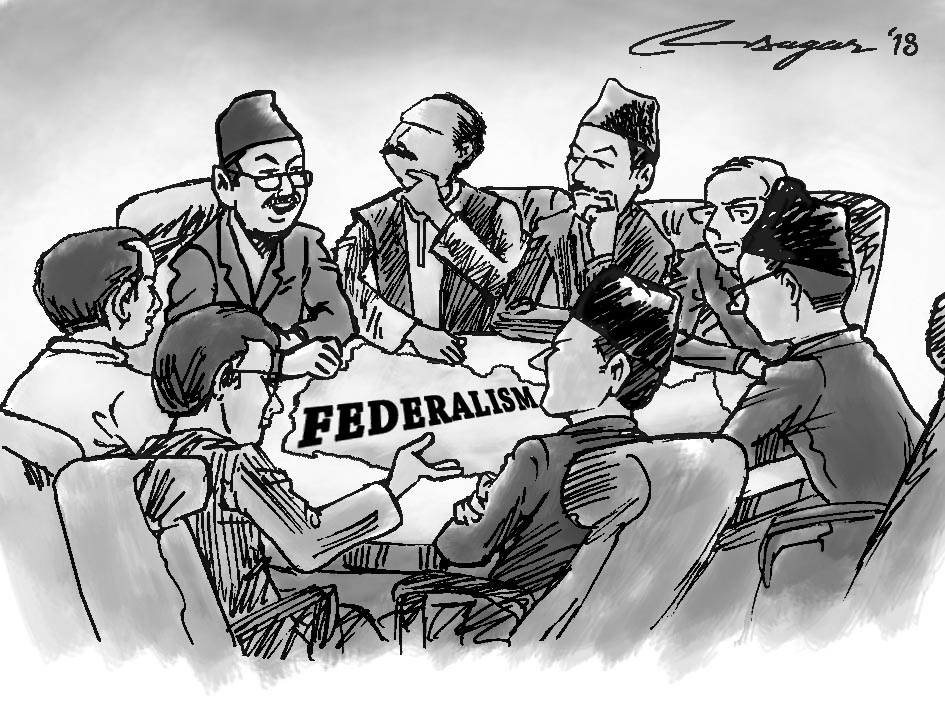Inter-Province Council: Roadmap to resolution
It took nine months for Inter-Province Council to hold its first meeting. Though late, it’s a good initiative. Now there is a need to continue the initiative so as to address challenges related to federalism
Nine months after the elections, the Inter-Province Council (IPC) met for the first time on December 8. The two-day conclave between the prime minister and seven chief ministers was an important milestone in the evolution of federalism in Nepal.
Article 234 of the constitution has envisioned the Inter-Province Council to settle “political” disputes between federal and provincial governments or between provincial governments. In the past nine months, frictions and tensions between the federal government and provincial governments came to the fore numerous times. People expected that such teething problems would be taken care of by utilising the institutional mechanism envisioned by the constitution.
However, for reasons that we need to delve further, it took nine months for the IPC to hold its first meeting.
The historic meeting provided the opportunity for the chief ministers to open up and apprise the prime minister of immediate challenges. It also provided PM KP Oli the opportunity to directly talk with the chief ministers and discuss ways to address impending challenges.
The chief ministers’ major grievances were lack of staff that was hampering smooth functioning of their governments, budgetary/ tax constraints, lack of basic infrastructure and lack of legal framework. Many of them complained that the laws the federal government should have formulated for them were still not in place. They also complained that even the projects that were earlier handed over to provinces had now been withdrawn by the federal government.
The two-day IPC meeting concluded with formation of a powerful task force headed by the federal home minister. The task force has federal finance minister, federal minister for federal affairs, and chief ministers of Provinces 2 and 5 as members. Chief secretary of the federal government is the member secretary. The task force has been asked to prepare a report on ways to address the issues raised by the chief ministers within one week.
First of all, the task force must look into law making. The new constitution has clearly specified in Article 304 that all laws that are inconsistent with the constitution will be null and void after one year since the first parliamentary session, i.e. by March 4 next year.
Therefore, the federal government must first prepare appropriate laws related to the areas mentioned in Schedule 7 (including list of concurrent jurisdiction between province and federal levels) and Schedule 9 (including list of concurrent jurisdiction among province, local and federal levels). These Schedules include areas such as civil and criminal matters; supplies, and price control; national security; inter-province transfer of detainees; property acquisition rights; social security; province lokmarga; province investigation bureau; province public service commission; province infrastructure; forest; education; health; agriculture; vehicle management; royalty from natural resources etc.
Under these areas, the federal government needs to formulate 300 new laws. A little over 100 laws have been formulated so far. The government has made changes in 197 other laws by just changing some phrases through amendment to some Nepal Acts. A recent study by the Law Ministry had shown that the government needed to formulate new laws in 36 areas. Likewise, it also needs to further change some phrases in 164 additional subjects. All of these must be completed by March 4.
The task force must take these issues into consideration and recommend an action plan for the federal government, provincial governments and local governments along with categorisation of laws/subjects; responsible agency; and timeline. They should also suggest that lawmakers seek support from experts and civil society to make the process participatory and effective. Dialogue between the drafters and representatives of concerned stakeholders is a must. That apart, the other major responsibility on the shoulders of the task force is to recommend formation of National Natural Resource and Fiscal Commission because it is the prime body that fixes model/formula of resource collection and distribution among the federal, province and local levels. It is one of the most important bodies on whose effectiveness the success of federalism depends. It is responsible for laying down broad framework for distribution of natural resources among federal, province and local levels. It is also responsible for reforms in revenue mobilisation and expenditure at three tiers of the government.
Therefore, in its recommendation, the task force can also suggest ways to make the commission full of experts on federalism, taxation and administration. It should not be another example of dividing roles among political parties. The task force should also include in its report some sort of mechanism to ensure that IPC meetings are held regularly — once every three months — and also when necessary.
Although the task force has very short time and limited mandate, it should hold dialogue with stakeholders. Most importantly, after the task force prepares its report, its features should be made public and subjected to further discussion. Practice of incorporating public feedbacks must be followed.
Pradhan is executive director of Nepal Law Society






